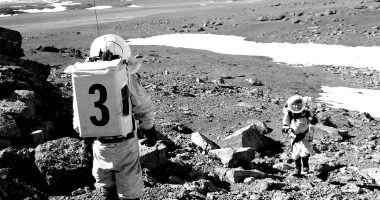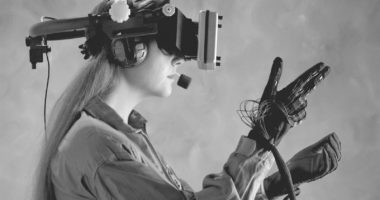
As a result of the intense heat, a merchant and his secretary take refuge in the water to write their letters. 1926 | Georg Pahl, Wikimedia Commons | CC BY-SA
In recent years there has been a strong sense that we need new narratives about reality. This is no random whim, but a social tool, a necessary change if we want to address the world, and above all, give it meaning. Now that we are faced with the challenge of even greater polarisation we look at how this issue is becoming an increasingly popular theme.
It is nothing new to insist that we find ourselves in a historical, exceptional, volatile and seemingly chaotic situation. Even so, there are a series of social implications that need to be revisited again and again. The origin of these implications has to do with the relationship between the events that make the situation historical, exceptional, volatile and seemingly incomprehensible at times.
Because our reading of the world, including that which says there is no possible temporal reading, that everything is simple and nothing more than improvised adaptation, directly affects how we make decisions. Both those that have a direct impact on the world and participate in designing it in some way, as well as our day-to-day decisions. Narratives, including those that are scientific or guided by collective knowledge, bring order to the world.
It is also nothing new to talk about the fact that, in the times in which we live, the generation and adoption of new narratives about the world are called for. Narratives that help us to make sense of the world. Narratives that help us aspire to and build a better future.
Some narratives already exist, within the arts, science fiction and speculation in various forms. In science, as reflected in the beginning of the exhibition “Science Friction“, we can mention the paradigm shifts that, since the 60s and 70s, have been bringing about advances in biology, ecology, biochemistry and complexity science, as well as in philosophy, the philosophy of science and other fields.
But the fact that they exist or come into being does not, as we well know, mean that they immediately take root. As can be imagined, we live in a moment in which old narratives and new narratives exist side by side. And occasionally we can see the friction generated between these narratives and the world, or between each other.
Necessary but strange-sounding concepts: epistemology and beliefs as super-tools for changing the world
Here I will make a small, very introductory digression into two essential concepts.
Epistemology is the study of the nature of knowledge, what it is that makes something be understood as knowledge, both universally and within a particular human discipline or field, and how we construct it. It is not the same, however, as pedagogy, which studies how we learn and teach and the best ways of conveying information, data and knowledge as successfully as possible.
Doxastic logic, meanwhile, studies how we reason and construct views and beliefs about the world. Not spiritual beliefs, but reasoning in which we simply believe. Beliefs may be grounded in knowledge, but they do not have to be. And they may be consistent, just as they may often have logical holes in them, but they work because they are statements in which we believe.
In 1993, the philosophers of science J. Ravetz and S. O. Funtowicz spoke of the fact that science, in order to be applicable to the present, needed to reflect on how it should be developed and applied. In the classical style they called it “normal science”, a concept that for a more famous philosopher of science, T. Kuhn, meant the usual way of working of a given scientific community. Normal meaning that which is usual, but also socially normal. Normality and that which appears to us as being plausible, possible or realistic go hand in hand.
However, Ravetz and Funtowicz showed that this normal, or sometimes even dogmatic, way of doing science created different types of friction with reality and social needs that depended on up-to-date scientific knowledge on issues such as climate change. They postulated a phase, which at that time was one of experimentation and paradigm shifts in science, under the concept of ‘post-normal science’.
We have to consider that in the 60s and 70s, at the same time, there began to emerge a sense of emergency towards transdisciplinarity in order to study and understand world phenomena that have apparently chaotic, unexplainable behaviours (without any possible order) but which, when more specific elements of the phenomenon are analysed, can in fact be explained.
Transdisciplinarity was also needed to study the behaviour and relationships between things that were investigated in isolation by different disciplines, such as activities of human origin or interaction with animals, plants, fungi, the environment, or electronic and surveillance devices.
It may now seem like the distant past, but those explanations with which a good number of contemporary societies make sense of the world, such as for example that the Earth or Mars are part of a larger system in the corner of a titanic entity called ‘the Milky Way’, or anthropocentrism and humanism (i.e. humans are the ones who shape and measure the universe; the centre of everything), were Copernican revolutions around 500 and 200 years ago. At that time, they were branded as flights of fancy, and even as blasphemies and taboos. Today, they are normal.
But we have more and more knowledge, and the reality that surrounds us also changes, sometimes without regard to whether our explanations change in step (as we now know, we can’t control everything!).
The revision and open reflection of what we understand as natural and given is necessary when we realise that the same frameworks with which we explain the world start to become problematic and the only answer we are left with is «nothing makes sense, therefore everything is chaotic, so let’s play it by ear and see what happens».
Mars, us and the multiple Marses. We haven’t arrived yet and it’s already a major field of speculation.
Space: the final frontier. These are the voyages of the starship Enterprise. Its five-year mission: to explore strange new worlds. To seek out new life and new civilizations. To boldly go where no man has gone before!
Introduction that appeared in the title sequence of every episode of Star Trek (1966-1969)
Mars is an interesting case study. As portrayed in the exhibition “Mars. The Red Mirror”, today the mainstream perspective views it as the next space for the colonisation of humanity, one that is our right. A right that emerges precisely from the discourse on nature and our position as human beings in the centre of the universe (anthropocentrism). Or, to put it even more simply, because we can, because we are inevitably getting closer and closer to the know-how needed to make it a real future possibility.
But if we superimpose the questioning of these basic principles that lead us to view Mars as the destination into which we need to expand, or if we overlay them with the material and then ethical issues that mean accepting even purely scientific advances, such as some of those mentioned so far, dilemmas arise that have not been faced until now. And for some, they are taboo, uncomfortable, or of questionable pragmatism with respect to the day-to-day economy and the aspiration for maximum efficiency.
There would open up before us new Marses, and new questions beyond that of “do we really need to go to Mars when there are problems here on Earth?”
Mars to escape from an environmentally and socially bankrupt Earth, as proposed in the backstory to Blade Runner (R. Scott, 1982).
Mars to expand into the universe, to exceed the spatial limit of our current planet. And as a place where we can build.
The Mars that participates in the gravitational relationships between the different bodies that make up the Solar System. A separate entity.
The Mars that is an entity in its own right, one that may or may not have hosted life, which becomes a natural space a few centuries after being studied and discovered as something more than just a red star in the sky. With its own environmental balances and stability, even if they won’t be to the measure of human beings for some time.
The Mars that, as emphasised in series such as ‘The Expanse’ (2015-2021) – to give another example inspired by the work of K. S. Robinson that speculates on the extensive complexity and significance of expanding outwards to other planets – will have to remain dependent on Earth (including the Moon) for many, many decades once colonisation, however minimal, is initiated.
How can these dependencies be made viable? What advantages compensate for a world that from the outset requires terraforming to adapt it to human beings? Beyond technological solutionism, which may imply greater complexity and more interdependent and possibly redundant elements, do there exist other solutions? And etc… run with it in whichever direction you want from here.
Mars as an excellent laboratory for generating questions that may not be about Mars.
A critical situation in terms of explanations about the world
At 8 o’clock in the evening there was no possibility of solar energy being generated because it was dark.
Pablo Casado, leader of the Spanish People’s Party, 14 November 2021
For now, however, the question at hand is not whether we have the proper theory of truth, but how to make sense of the different ways that people subvert truths.
L. McIntyre, Post-Truth, 2016
The explanations about the world in which we believe form the basis for our decisions and give meaning and order to the things that happen to us. Even more so in a hyper-saturated world of information and counter-information, where the dynamics of trust are subverted towards new ones.
If in mid- 2019 someone had predicted that in 2020 we would be hit by a pandemic of epic proportions, the chances are that no one would have believed it. The significant thing is that we would never have believed that an event with such diverse, complex and terrible human implications – one that overturned things we took for granted, such as everyday life or having any product available in the shops without the need for stocking up – could happen to us.
The feeling of unreality. And the sensations provoked by the uncertainty of not understanding what will happen next. Followed by another event, and another, and another, which don’t seem like normal events. Either because they don’t seem to follow any logic or pattern, or because the answers given to them are either unheard of or don’t seem morally correct.
En cada rincón del mundo y en el reino mineral, hay algo que los humanos dimos tan por natural ¿Y si cuidar no fuera capricho moral? ¿Fuera pura condición vital? (In every corner of the world and in the mineral kingdom, is there anything that we humans considered so natural? And if caring weren’t a moral whim, if it were a vital condition?)
Maria Arnal and Marcel Bagés, 2021, Fiera de mí (Song)
It is no moral whim to voice the need for new imaginaries to guide us into the future, just as we need new narratives with which to address and to clean up the world. Ones that have a responsible approach to reality. Even in relation to our social relationships, or how the economy addresses the dilemmas of sustainability.
They help us to make sense of things. To neatly structure our decision-making in relation to our environment and the changes in the world. Or to structure ethical analysis, now that there is so much talk of this, for example, in relation to Artificial Intelligence.
As expressed by the sociologist L. Winner, as well as other social scientists, including B. Latour, also around the year 1980, technological solutions, for example apps, facial recognition systems or CO₂ capture systems like those built by ClimateWork, are also built on the basis of the criteria and values of those who design, produce and distribute them.
And so, in order to respond to the current challenges, we must first determine how to explain them. And in this way determine with new clarity the answers – whether to definitively expand in new directions across the Solar System, or to amplify our symbiotic and cooperative relationships with technology, or with other living things such as bees, trees, fungi and invertebrates to mitigate unwanted and destructive climate change created by ourselves.






Leave a comment